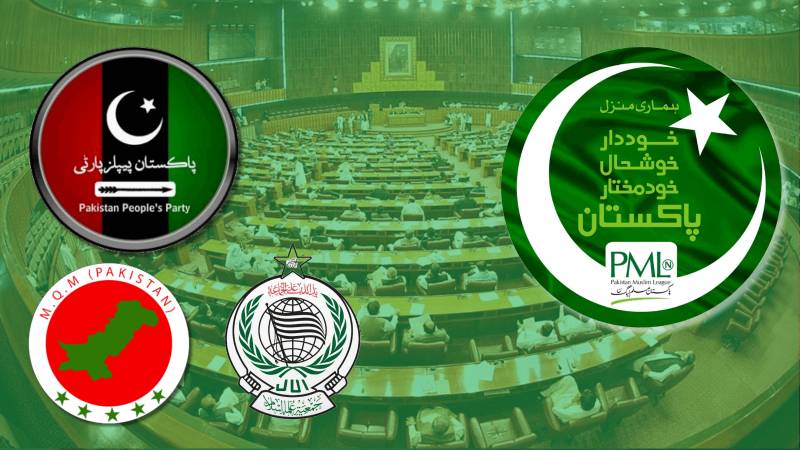
The coalition government, dubbed by some as Pakistan Democratic Movement (PDM) 2.0 (to denote the second iteration of the rainbow coalition that took over after ousting Imran Khan from government in 2022), has so far ensured that the protracted transition of power has been peaceful. But storms have been gathering on the horizon, which could make for some rough sailing ahead.
The government has thus far navigated the minefield of cobbling together a coalition and easily securing the elections of the speaker of the house and of the President, electing their choice candidates in Shehbaz Sharif and Asif Ali Zardari. The matter of distributing ministries has also been resolved amicably, for now.
However, the true test of its 'romance' with allies could still be exposed in the coming days as decisions on key parliamentary positions are to be made.
Pakistan People's Party (PPP), the main allied partner of the ruling party in the centre, politely refused to become a part of the federal cabinet. Dubbed the "kingmakers" for the 2024 elections, given its haul of 54 seats (a substantial size that will be necessary for any party to co-opt to form a government), the party has maintained it has no desire to subject itself to the stern test of governance just yet. However, parliamentary positions and legislative work through chairmanships of key standing committees in the national assembly are a different matter altogether.
Senior party members have expressed that they, rather than the ruling Pakistan Muslim League-Nawaz (PML-N) or other smaller coalition members, have a right to these slots.
Political analysts believe the PML-N, after being surprised by the PPP's decision not to take up cabinet positions, it could feel pressured to accommodate this desire of the PPP. The real challenge will be in how the PML-N can balance the desires of the PPP with its other allies inside and outside Parliament.
Sources claimed that the PPP has staked a claim to the chairmanships of the foreign affairs, Interior and some other standing committees of the national assembly.
The allocation and formation of the standing committees is expected to commence in the second session of the national assembly, which is likely to be summoned next week.
On the other hand, murmurs of discontent are already rising. Sources in the Muttahida Qaumi Movement-Pakistan (MQM-P) say their party's leadership is unhappy about its reduced role in the 19-member federal cabinet.
The party had sought multiple ministries in the federal cabinet and with greater representation. While it got its wish of multiple ministries, MQM-P Convener Khalid Maqbool Siddiqui was handed the portfolio of Science and Technology together with Federal Education and Professional Training, that they were limited to only a single member of their party making it to the federal cabinet, left a bad taste in their mouth. In addition to this, the fact that the MQM-P did not get all of its desired ministries, including information technology and ports and shipping, left them feeling exploited and short-changed. A leaked audio from MQM-P aligned Sindh Governor Kamran Khan Tessori and from Mustafa Kamal was a testament to that feeling of disgruntlement.
As compensation, party insiders said that they will definitely seek chairmanships of some major standing committees in the national assembly, including the Port and Shipping, Overseas Pakistanis, and other committees.
The politico-religious party, the Jamiat Ulema-e-Islam Fazl (JUI-F), has already shared its grievances with the ruling party so much so that JUI-F Chief Maula Fazlur Rehman expressed his reservations before the media.
In such a situation, the ruling PML-N will face immense pressure to pass another test in the coming days and smoothly run the affairs of the coalition government.
Political analysts believe that the prime minister faces multiple critical challenges, including an existential economic crunch and pressure to maintain good relations with increasingly hostile neighbours, while domestically, he has to keep its allies happy.

